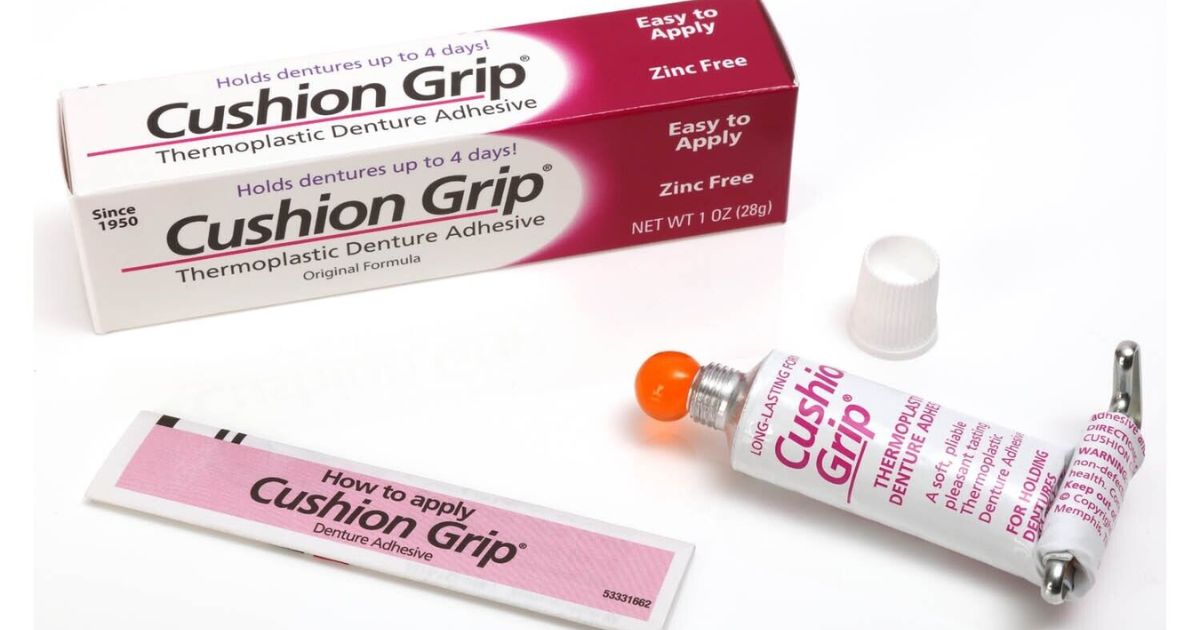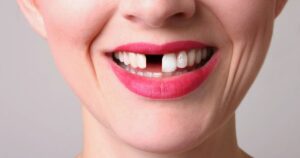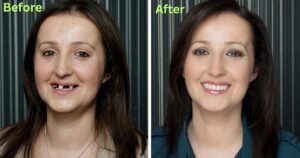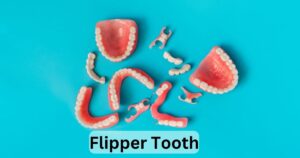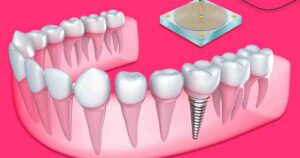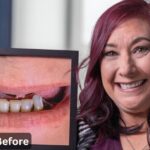Dentures are a common way for people to replace missing teeth. However, dentures can occasionally slip or move around in the mouth. This is where denture adhesives come in. Denture adhesives are creams or pastes that are applied to the surfaces of dentures that contact the gums. They work to securely adhere the dentures in place for improved fit, comfort, and function.
In this comprehensive guide, we will explore everything you need to know about denture adhesives. We’ll discuss what they are, how they work, common types, benefits of use, application instructions, potential side effects, and more. By the end, you’ll have an in-depth understanding of these important dental products. Let’s get started!
What are Denture Adhesives?

Denture adhesives are commercially available over-the-counter dental products designed to enhance the retention and stability of removable dentures. They come in different formulations such as creams, pastes, or powders. All denture adhesives work similarly by adding an extra layer of bonding between the denture base and the gums or oral tissues. For some patients with implant dentures, adhesives can provide additional retention support between the denture bases and dental implants.
When applied as directed, denture adhesives help the dentures adhere more securely in place. This reduces the risks of slippage, gaps, clicking noises, and accidental swallowing or inhaling of loose dentures during eating, speaking, laughing, or other activities. Having stable dentures leads to improved chewing ability, comfort level, self-esteem, and overall oral health.
Some key things to note about denture adhesives include:
- They are not a permanent or definitive solution and dentures may still require periodic relining by a dentist.
- Adhesives should not be used as a replacement for a good denture fit achieved through professional adjustments.
- They are temporary solutions meant to augment existing dentures, not to excuse poorly-fitting dentures.
- Different formulations vary in durability – some last 4-8 hours while others up to 24 hours.
So in summary, denture adhesives are topical dental products that stabilize removable dentures through enhanced adhesion to mouth tissues on a temporary daily basis.
How do Denture Adhesives Work?
Denture adhesives work through physical and chemical adhesive properties to securely bond dentures in place. Here’s a closer look at their adhesion mechanisms:
Physical Adhesion
When applied to the denture fitting surface, denture adhesives swell and coat the surface with an adhesive film or layer. This swelled coating conforms closely to the contours of the gum ridges. The intimate physical contact between the adhesive coating and tissues leads to intermolecular attractive forces that resist separation.
Chemical Adhesion
Some adhesive formulations contain adhesive polymers like polymethyl vinyl ether-maleic anhydride that interact and crosslink with proteins in the oral tissues. This results in covalent chemical bonding between the denture adhesive and surface proteins, further boosting retention strength.
Surface Energy Effect
The adhesive-coated denture surfaces have higher surface energy than dry denture surfaces. This positive surface energy differential provides an innate driving force pulling the adhesive-coated dentures firmly against the surrounding tissues. Suction-like effects occur as the positively charged adhesive surface is drawn to the slightly negative oral mucosa.
Through a synergistic combination of these physical, chemical, and surface energy adhesion mechanisms, denture adhesives can more securely anchor removable dentures than would be possible through physical suction and mechanical retention alone. This enhanced bonding significantly improves denture stability.
Common Types of Denture Adhesives
There are a few main types and formulations of denture adhesives available today. Let’s explore the differences:
Creams
Cream-based adhesives are the most common type. They come in a thick paste-like formulation that is easily spreadable. Creams generally adhere strongly for 4-8 hours and have a smooth, non-irritating texture. Some leading cream denture adhesives include Fixodent, Super Poligrip, and Strident.
Pastes
Similar to creams but with a thicker, stiffer consistency that may stay put a bit better during eating. However, pastes can be messier to apply. Poligrip is a popular paste adhesive.
Powders
Powder denture adhesives are sprinkled and tapped onto dry dentures. They require wetting from saliva for activation. Powders tend to be the least sticky but freshened breath. Sprinkle-on brands include Efferdent and Retainer Fresh.
Strips
Adhesive strips are pre-cut oval shapes that adhere to dental plateau areas with uniform thickness. Strips minimize mess but don’t coat the whole fitting surface. Strips last 4-6 hours. Exemplary strip adhesives are Fixodent Strips and Poligrip Strips.
Your dentist can help recommend the best adhesive type based on your specific denture needs regarding strength, duration, and application preferences. Different formulations may work better for certain patients.
Benefits of Using Denture Adhesives
There are numerous benefits to using denture adhesives regularly. Some of the top advantages include:
| Benefit | Description |
| Improved Retention | Adhesives securely anchor dentures, reducing their tendency to shift around or tilt inside the mouth. |
| Enhanced Comfort | Snugly fixed dentures allow for increased chewing power and speaking ability without fear of accidental slips. |
| Better Fit | Adhesives effectively fill in minor space discrepancies between ridges and base, creating a customized contour. |
| Prevents Sores | Correctly positioned dentures avoid tissue trauma that can cause painful sores and irritation to develop. |
| Increased Confidence | Adhesives alleviate the need for frequent cleanings and re-adapting of improperly seated dentures. |
| Superior Oral Health | Properly-fitting dentures enable thorough brushing and flossing to remove plaque and bacteria. |
| Time Saving | Time-Saving |
| Cost Effective | Denture adhesives are an affordable option versus the cost of routine denture remakes and relines from ill-fitting problems. |
Given these extensive perks, denture adhesives serve as an invaluable daily tool for full denture wearers seeking improved oral function and overall well-being. Their benefits typically outweigh any minor side effects or potential issues.
Instructions for Applying Denture Adhesives
Applying denture adhesive is straightforward with some easy steps:
- Clean Dentures & Mouth Thoroughly – Brush dentures and rinse mouth to remove food debris for best adhesion.
- Apply a Thin Layer – Use the applicator or your finger to thinly spread adhesive only on denture ridge areas contacting the palate and gums.
- Allow to Dry Briefly – Let the applied adhesive layer fully dry for 30-60 seconds until tacky but not wet.
- Insert Dentures Gently – Carefully seat dentures over the gums, pressing firmly into place with your fingers.
- Remove Excess – Wipe away any adhesive squeezed out around denture edges with a damp cloth.
- Consider Reapplication – Some adhesives may require additional application after chewing to maintain bonding all day.
For stronger adhesion, avoid hot foods or drinks immediately after insertion as heat can prematurely dissolve the adhesive bond. With practice, proper denture adhesive usage becomes second nature. Ask your dentist if you have any questions about the technique.
Potential Side Effects of Denture Adhesives
While denture adhesives are very safe for the majority of users when applied as directed, there are a few potential side effects to be aware of:
Tissue Irritation:
Some individuals may experience tender or irritated gum tissues if adhesives are over-applied or dentures interfere with normal breathing and swallowing patterns.
Allergic Reactions:
Rare but possible allergic contact dermatitis or other sensitivities could occur from adhesive ingredients like acrylates/C10-30 alkyl acrylate crosspolymer in certain patients.
Excess Residue:
Remnants of adhesives left on dentures after cleaning can accumulate and potentially encourage plaque/ Candida albicans biofilm formation over time if not fully removed.
Interference with Relines:
Adhesive residue deposited on the denture fit surface may interfere with accurate pickups required for denture relines or repairs.
Most issues are mild and transient, often resolvable by adjusting application amounts, switching brands, improving hygiene, or taking temporary breaks from product use. However, promptly inform your dentist about any persistent or painful symptoms. With caution and proper care, denture adhesives should pose minimal problems.
Factors Affecting Adhesive Effectiveness
Several individual and clinical variables influence how well denture adhesives will perform in enhancing denture retention and stability. Here are some key influencers:
- Quality of Denture Fit – Adhesives work best when dentures have proper border molding and anatomical fit already. Loose or ill-fitting dentures may not be sufficiently stabilized.
- Surface Condition – Dentures must be thoroughly cleaned to remove debris. A rough or porous surface allows for stronger bonding versus a slick, polished surface.
- Application Amount – Too little adhesive provides inadequate coverage while too much can squeeze out and detach prematurely. A thin, even layer is best.
- Saliva Levels – Excessive saliva production can wash away adhesives more rapidly than average saliva flows.
- Diet/Habits – Hot, sticky, or acidic foods/drinks can dissolve the adhesive bond faster than cooler, less viscous intake.
- Health Issues – Conditions like xerostomia (dry mouth) or polyphagia (excessive chewing) impact moisture levels and adhesive longevity.
- Denture Material – Soft dentures allow for better adhesion than hard denture bases which don’t absorb adhesive as well.
- Type of Adhesive – Formulations differ in viscosity, ingredients, and maximum adhesion strengths.
Proper application coupled with the above factors ensures denture adhesives perform to their highest ability.
Alternative Solutions for Improving Denture Fit
While denture adhesives are effective for many patients, other options exist for managing denture issues:
- Relines: Denture relines use hard or soft resilient reline materials placed inside the denture base to refit changing ridges.
- Soft Liners: Softer denture liners cushion pressure areas and improve the comfort of ill-fitting dentures until a reline can be done.
- Implant Overdentures: Implants placed in the jawbone can be used to anchor lower or upper dentures for high retention sans adhesives.
- Mini Dental Implants: Smaller diameter implants screwed into interforaminal ridge areas provide customized anchorage bars or clips to snap dentures onto.
- Denture Adjustments: Routine checkups catch issues where temporary denture adjustments or repairs can restore proper fit in minor problem areas.
While temporary in action, denture adhesives offer substantial benefits as an interim solution or supplemental support when combined with regular denture maintenance by your dentist. They ensure continued oral function and hygiene until a scheduled denture remaking can be finished.
Choosing the Right Denture Adhesive for You
There is no one-size-fits-all denture adhesive. It’s important to try different types to see what works best for your individual needs and denture situation. Here are some factors to consider when choosing:
- Duration needed – how long do you need your dentures to stay secured?
- Application – do you prefer a messy cream or easier strips?
- Cost – prices can vary significantly between brands
- Denture material – soft dentures may require a more gentle adhesive
Ask your dentist for samples to test at home. Keep notes on retention, comfort levels, and whether you experience any irritation. This will help narrow down the ideal adhesive for your lifestyle.
Proper Application Technique is Key
Getting the application just right is important for maximizing adhesive effectiveness and preventing side effects. Here are some tips for great technique:
- Use only a pea-sized amount and spread thinly with your finger or applicator stick
- Focus placement along the denture borders that contact gum tissues
- Let dry fully before insertion so it’s tacky but not wet
- Gently seat dentures and remove excess squeezed out the sides
- Reapply a thin layer periodically if eating hot or sticky foods
With some practice, you’ll soon master the adhesive application process.
Combining Adhesives with Other Aids
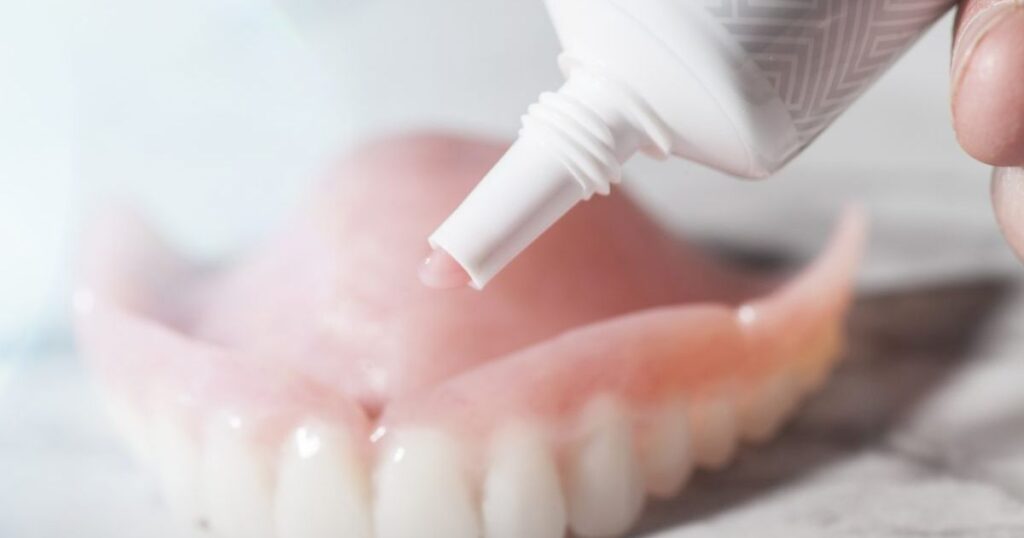
For patients with severe denture retention issues, combining adhesives with other auxiliary methods can boost stability even further:
- Denture liners under adhesives provide extra cushioning and slippage protection
- Temporary soft relines are generally applied at checkups to refit changing ridges
- Mini dental implants or implants can be incorporated when clinically indicated
- Proper denture care like soaking, cleaning, and storage are imperative to maximize product life
A team approach with your dentist determines the safest and most effective long-term solutions.
Frequently Ask Questions
How long does the adhesive last on dentures?
Most denture adhesives are formulated to last 4-8 hours. Some premium brands claim up to 24 hours of adhesion. Eating/drinking can diminish their effective time.
What glue is good for dentures?
Denture adhesives are specially formulated dental glues meant for dentures. Top brands include Fixodent, Poligrip and Super Poligrip. They bond dentures temporarily without causing harm. Regular glue is not suitable.
What is a denture adhesive?
A denture adhesive is a cream, paste, or powder applied to dentures that improve their fit by creating an extra bonding layer between the denture and oral tissues. This enhances retention, comfort, and function.
Which is the best denture adhesive?
There is no single best brand as effectiveness varies between users. In general, premium cream-based formulas from Fixodent and Super Poligrip tend to provide strong, long-lasting adhesion for most. But testing different types is best to find your optimal adhesive.
Conclusion
In conclusion, denture adhesives are a reliable and low-cost way for denture wearers to improve retention, stability, and oral function. By adding an extra bonding layer between dentures and gums, adhesives help dentures fit more securely and comfortably. For many patients, they offer a straightforward solution for managing ill-fitting dentures or minor issues daily. With the right product and application technique tailored to individual needs, adhesives empower denture wearers to smile and eat with confidence.
While denture relines and adjustments provide more permanent fixes, adhesives serve as an important supplemental tool in any full denture care routine. With education on formulations, usage instructions, and potential side effects, denture wearers can benefit from adhesive solutions discreetly and conveniently. When combined with diligent hygiene and routine checkups, adhesives uphold oral health and quality of life for millions worldwide who have lost their natural teeth.
